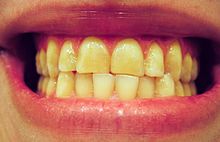
Back صرير الأسنان Arabic Bruxisme Catalan Bruxismus Czech Bruxismus German Bruxismo Spanish Bruxismo Basque دندانقروچه Persian Bruksismi Finnish Bruxisme French חריקת שיניים HE
| Bruxism | |
|---|---|
 | |
| Attrition (tooth wear caused by tooth-to-tooth contact) can be a manifestation of bruxism. | |
| Specialty | Dentistry |
Bruxism is excessive teeth grinding or jaw clenching. It is an oral parafunctional activity;[1] i.e., it is unrelated to normal function such as eating or talking. Bruxism is a common behavior; reports of prevalence range from 8% to 31% in the general population.[2] Several symptoms are commonly associated with bruxism, including aching jaw muscles, headaches, hypersensitive teeth, tooth wear, and damage to dental restorations (e.g. crowns and fillings).[3] Symptoms may be minimal, without patient awareness of the condition. If nothing is done, after a while many teeth start wearing down until the whole tooth is gone.
There are two main types of bruxism: one occurs during sleep (nocturnal bruxism) and one during wakefulness (awake bruxism). Dental damage may be similar in both types, but the symptoms of sleep bruxism tend to be worse on waking and improve during the course of the day, and the symptoms of awake bruxism may not be present at all on waking, and then worsen over the day.
The causes of bruxism are not completely understood, but probably involve multiple factors.[4][5] Awake bruxism is more common in women, whereas men and women are affected in equal proportions by sleep bruxism.[5] Awake bruxism is thought to have different causes from sleep bruxism. Several treatments are in use, although there is little evidence of robust efficacy for any particular treatment.[6]
- ^ Wassell R, Naru A, Steele J, Nohl F (2008). Applied occlusion. London: Quintessence. pp. 26–30. ISBN 9781850970989.
- ^ Cite error: The named reference
Manfredini 2013was invoked but never defined (see the help page). - ^ Cite error: The named reference
Tyldesley 2003was invoked but never defined (see the help page). - ^ Cite error: The named reference
Cawson 2002was invoked but never defined (see the help page). - ^ a b Cite error: The named reference
Shetty 2010was invoked but never defined (see the help page). - ^ Cite error: The named reference
LOBBEZOO 2008was invoked but never defined (see the help page).
© MMXXIII Rich X Search. We shall prevail. All rights reserved. Rich X Search